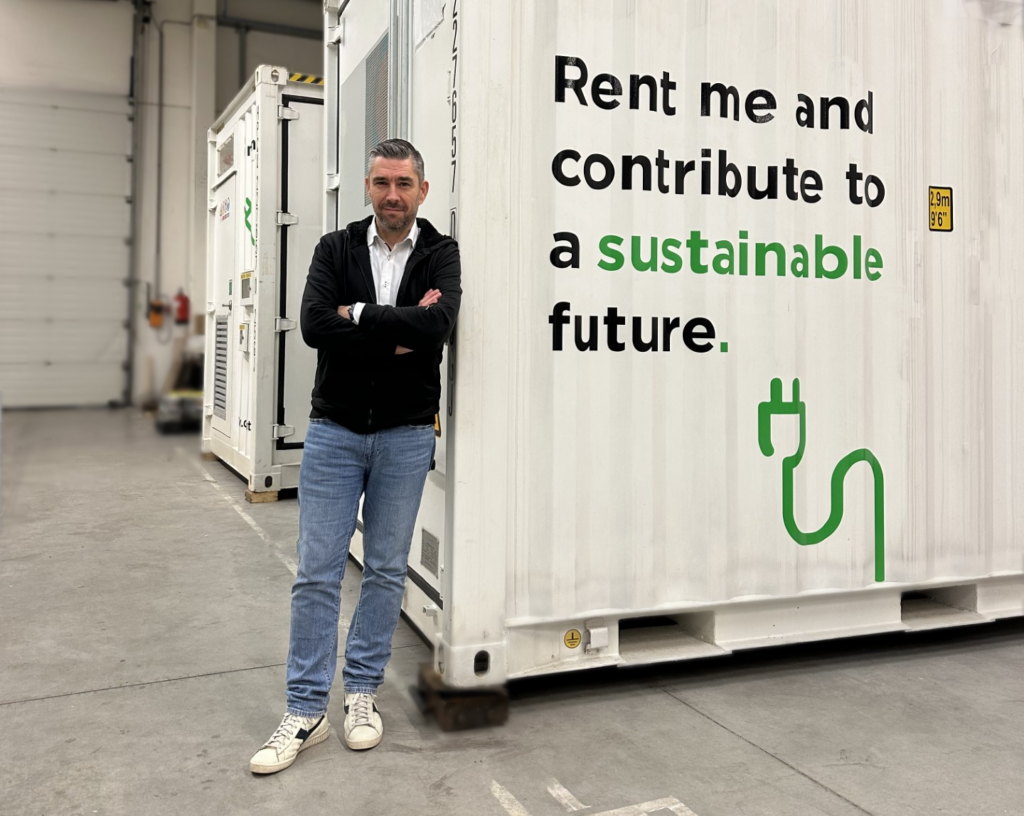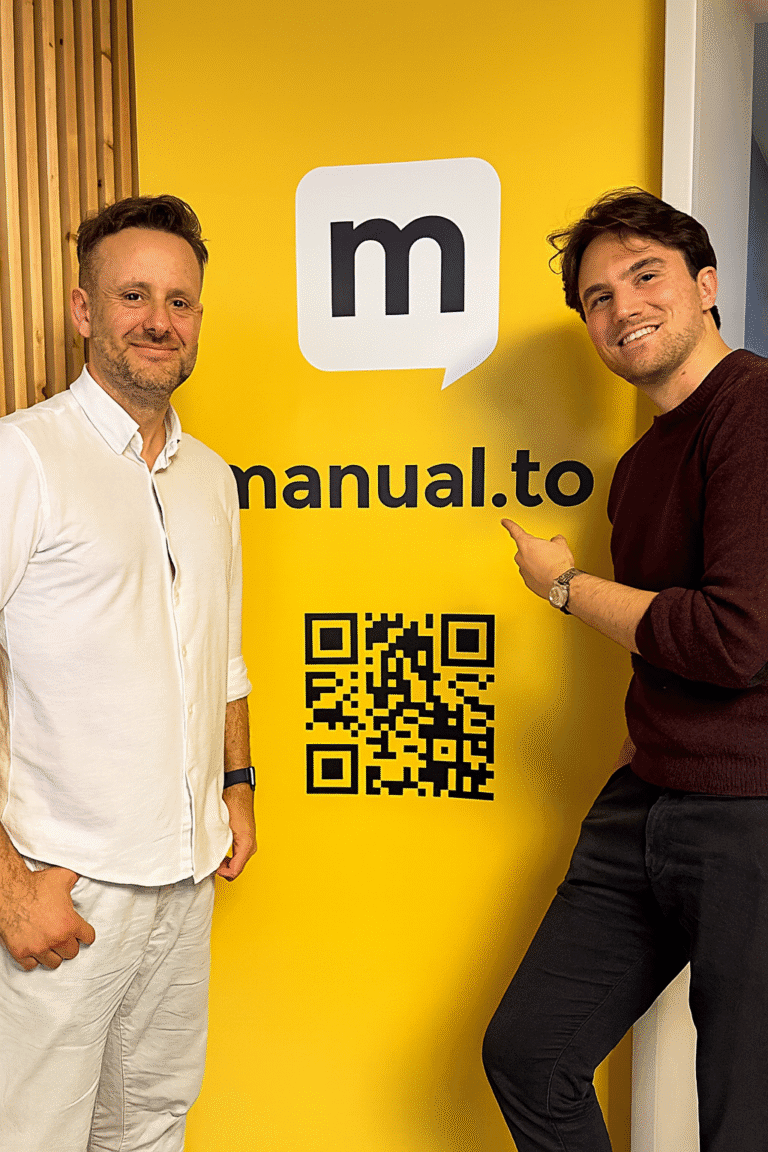Bjorn Robbens (C-battery): “Batteries will inevitably play a crucial role in any energy management strategy”

C-battery, which recently became a partner of Log!Ville, develops energy storage solutions that make it possible to buffer (green) power. According to CEO Björn Robbens, batteries will inevitably play a crucial role in any future-proof energy management strategy, including in logistics. “Interest in the market is growing as demand for charging infrastructure for trucks, among others, increases,” he says.
Who are C-battery?
C-battery was founded about three years ago as a manufacturer of batteries and storage systems. We focus exclusively on the B2B market and, more specifically, industry and logistics. Batteries for residential purposes are therefore not part of our scope.
We build our storage solutions in Flanders, more precisely in Oudenaarde. So we are not trading Chinese systems: we develop, produce, and maintain cellular modules and systems. We do that ourselves because we want to be close to the customers.
Do you then produce to order for those customers?
No, in the sense that our batteries are scalable. We start from a small unit – shown at Log!Ville – which we can expand to adapt to customers’ needs. Our modular and scalable design ranges from 75 kWh to several MWh.
The C in C-battery stands for Cordeel. Are you a subsidiary of the construction group?
C-battery is a 50/50 joint venture. I co-founded the company with the Cordeel group from my other activity, Saroléa. That was an iconic motorbike manufacturer from Herstal that ceased to exist in the 1960s, which I restarted with my brother Torsten in 2010 as a builder of 100% electric motorbikes. This regards race bikes and high-tech top-of-the-range models.
Batteries for such electric motorbikes have to be ‘high performance’ and withstand extreme weight and energy density requirements. They are therefore very complex. Those batteries are a niche product but their strong properties mean that they can form the basis for batteries intended for demanding mobile and static purposes. We therefore wanted to grow and scale up in that.
As a builder of logistics and industrial buildings, Cordeel was looking for batteries and energy storage systems for two reasons. A first is to green building processes, where they wanted to make the switch from diesel generators to green mobile yard batteries. The second is that warehouses can become ‘powerhouses’ with their solar panels, and battery storage systems will therefore become indispensable. This requires knowledge and expertise that they did not yet have in-house but, thanks to Saroléa, we do.
So bringing these areas of expertise together from a strong B2B vision is a ‘win-win’ for both parties.
What are the challenges?
The energy landscape will evolve enormously and become more complex in the coming years. This will require not only batteries, but also energy management software.
After all, it is not just about storing self-generated green electricity in batteries. Industrial and logistics companies also still need to buy electricity because renewable energy production can be quite unpredictable. To decrease that bill, for example, you need to be able to buy smart. It will also be necessary to better align energy consumption and (renewable) energy production.
In addition, in logistics, charging and fast-charging infrastructures will be complex to manage. Smartly managed battery storage not only helps a company make the most of its renewable energy sources, but also protects it from power surges and possible power outages.
Besides, grid stabilisation is one of the most important challenges in the field of energy. We do not yet have grid congestion, but the Netherlands already faces it. Energy storage will therefore play a crucial role in matching energy production to energy consumption.
Yet not so many companies in our area have already taken the plunge into batteries. Why is that?
Today’s storage systems are mainly lithium-ion batteries. The perception is that they can cause fires and are therefore potentially dangerous, so some companies remain reluctant. We counter that by equipping our batteries with an advanced Battery Management System, by using non-explosive Li-Ion cells and by equipping our modules and racks with an integrated extinguishing system. This combination of safety ‘features’ is unique in the world!
Our batteries are also more sustainable because they use lithium ferrophosphate (LFP) and not cobalt. They also require fewer rare earths.
In addition, we are also developing so-called ‘solid state’ batteries, the next generation of storage systems. Unlike the current generation of Li-Ion batteries, these batteries do not use a liquid electrolyte but a solid one, making them much more chemically stable.
That technology is still under development. For this, we are working together with imec and Solvay. We do expect to have a first pilot system operational in the course of 2025. By 2026 or 2027, we could really put solid-state batteries on the market.
Are companies in the logistics sector aware enough of the advantages of batteries?
Actually not yet, and that has to do with the lack of knowledge of existing systems. Companies often fail to acknowledge that batteries can not only make them less dependent on the grid, but also provide a more stable and cheaper energy supply. Other advantages, such as avoiding peak consumption taxes and the possibility of installing (fast) charging stations almost everywhere, often still elude them.
There are also still misconceptions about the time it takes for the investment to pay off. Our batteries have a long life expectancy and can withstand more charging cycles. They account for a lifespan of 16 years and more, which therefore has a favourable effect on ROI.
That said, there is a turnaround in the market – and certainly in the logistics sector – as demand for truck charging infrastructure increases, among other things. C-battery has remained somewhat under the radar since its inception but now that the turnaround is observable, we want to make our expertise better known. That is one of the reasons, by the way, why we became a partner of Log!Ville.
Do you mean that logistics companies are now ready, thanks to batteries, to build their warehouses into powerhouses?
I will answer with a nuanced ‘yes’. Is the technology ready? Yes. Is the market ready? Yes. Are the companies ready? It is starting to come. So our job is to ‘evangelise’ the sector and point out the need for a realistic ROI. These are big investments, from a few hundred thousand euros to a few million euros. You don’t take a decision like that overnight. Our job is to help them work out a business case and support them in their choice.
Incidentally, not only the unpredictability of solar and wind energy but also the volatility of the energy market provides a boost. Batteries can stabilise and optimise the grid, making it possible to shorten ROI.
Are your customers mainly companies that call on Cordeel to build their warehouses?
Today, we work closely with C-energy, a branch of the Cordeel Group that unburdens companies on energy by offering ‘Energy as a Service’. Our ambition, though, is to build 50% of our business alongside Cordeel. To this end, we are working out various partnerships to be able to offer one integrated system for those customers as well. Our presence at Log!Ville should make that visible.
What does C-battery present at Log!Ville?
First, our smallest modular battery system with a capacity of 75 kWh and a power of 30 kW. We show that this is scalable and that with the integrated extinguishing system it is safe. That type is good for SMEs that want to charge e-delivery trucks or forklifts. For electric trucks and tractors, we are talking about batteries of 500 kWh or even more than 1 MWh.
We also show the functionality of our software platform – which is open and can therefore interact with the various energy players – as well as a mobile construction site battery. By the way, this can be used not only on construction sites, but also at festivals, events and the like. Another possible application, thanks to the integrated quick charger, is on-site charging of trucks whose batteries have run down. We discovered this at Log!Ville.
Is discovering needs in the logistics sector also a motivation for being at Log!Ville?
Yes indeed. We believe in the interaction between the visitors – and the other partners of Log!Ville – and C-battery. They can learn what we can do for them and how we can unburden them. In addition, we can better understand the specific needs of logistics companies. We have the knowledge of batteries in-house but need a feel for the market to drive further developments in the right direction. So mutual information is needed.



